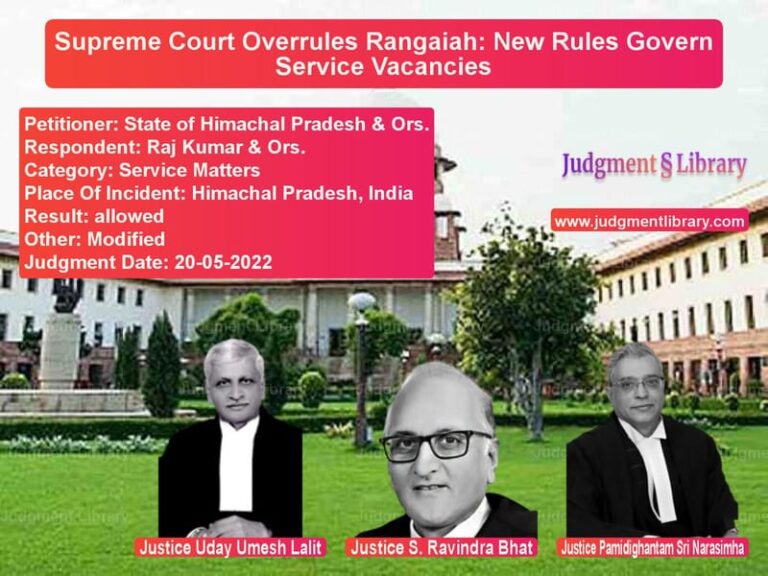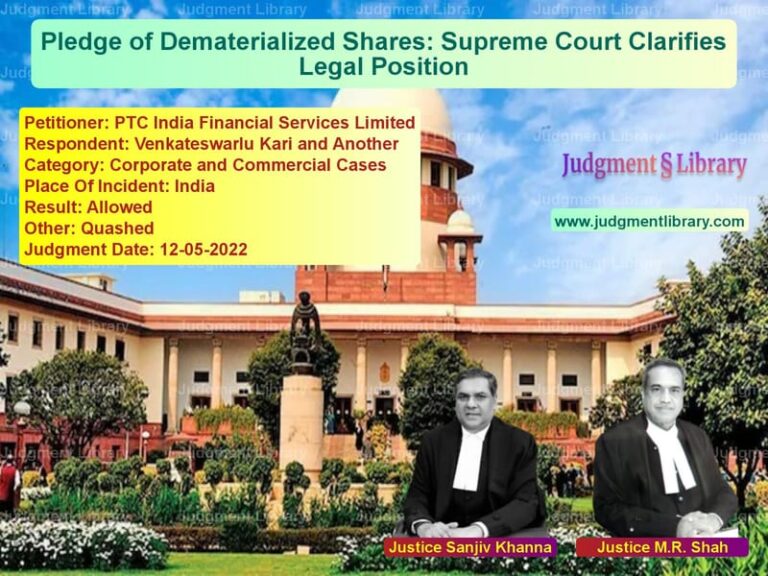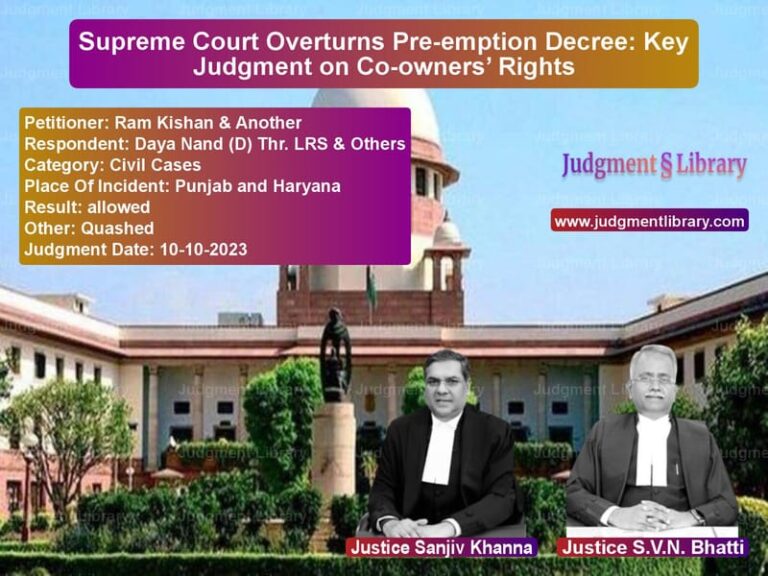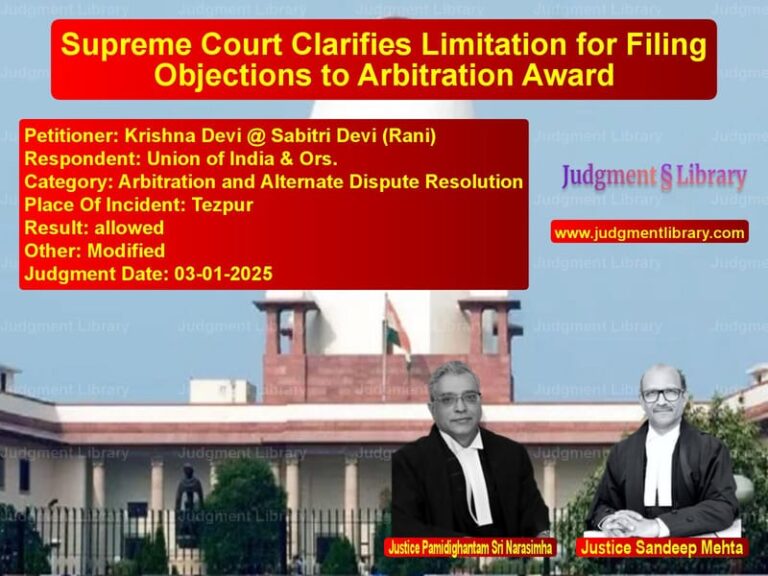Supreme Court Reinstates Corruption FIR Against Public Servant: Karnataka Lokayukta Case Explained
The case of State of Karnataka vs. T.N. Sudhakar Reddy is a critical judgment where the Supreme Court reinstated an FIR against a public servant accused of corruption. The Court held that a preliminary inquiry is not mandatory before registering an FIR under the Prevention of Corruption Act, 1988, provided that a well-documented source information report discloses a prima facie case.
The appeal was filed by the State of Karnataka challenging the Karnataka High Court’s decision to quash the FIR against T.N. Sudhakar Reddy, a Deputy General Manager (Vigilance) at BESCOM. The Supreme Court overturned the High Court’s ruling and reinstated the FIR, allowing the investigation to proceed.
Background of the Case
The case originated when the Karnataka Lokayukta Police received credible information that the respondent, T.N. Sudhakar Reddy, had acquired assets worth Rs. 3.81 crore, which were 90.72% more than his known sources of income. Based on a source information report submitted by the Lokayukta Police Inspector, the Superintendent of Police directed the registration of an FIR on December 4, 2023, under Sections 13(1)(b) and 13(2) of the Prevention of Corruption Act.
The respondent challenged the FIR before the Karnataka High Court, which quashed it, ruling that no preliminary inquiry had been conducted before the FIR was registered. The State of Karnataka then approached the Supreme Court.
Key Legal Issues
- Whether a preliminary inquiry is mandatory before registering an FIR under the Prevention of Corruption Act.
- Whether the Superintendent of Police was competent to issue an order directing investigation under Section 17 of the Prevention of Corruption Act.
Arguments Presented Before the Court
Appellant’s Arguments (State of Karnataka)
The State of Karnataka, represented by its counsel, argued:
- A preliminary inquiry is not mandatory if the source information report itself discloses the commission of a cognizable offense.
- The Superintendent of Police properly exercised his authority under Section 17 of the Prevention of Corruption Act to direct the registration of an FIR and investigation.
- The High Court misinterpreted legal precedents, particularly Lalita Kumari vs. Government of Uttar Pradesh, where the Supreme Court held that a preliminary inquiry is discretionary in corruption cases, not mandatory.
Respondent’s Arguments (T.N. Sudhakar Reddy)
The respondent’s senior counsel contended:
- The FIR was invalid as no preliminary inquiry was conducted before its registration.
- The Superintendent of Police acted mechanically and did not provide substantive reasons for registering the FIR.
- The High Court correctly quashed the FIR as the procedure laid down under Section 17 of the Prevention of Corruption Act was not followed.
Supreme Court’s Analysis and Observations
The Supreme Court noted that the entire case revolved around the interpretation of whether a preliminary inquiry is mandatory in corruption cases. It referred to the landmark Constitution Bench ruling in Lalita Kumari vs. Government of Uttar Pradesh, where the Court held:
“A preliminary inquiry is not mandatory in cases where the information received clearly discloses the commission of a cognizable offense.”
The Court further relied on State of Telangana vs. Managipet, which reiterated that a preliminary inquiry is not a vested right of the accused but a discretionary measure for the investigating agency.
Verbal Arguments of the Court
While delivering the judgment, the Supreme Court made several key observations:
“When the investigating agency has received detailed and well-documented information pointing towards the commission of an offense, the necessity of a preliminary inquiry is negated.”
“The Superintendent of Police had demonstrably applied his mind and issued a reasoned order for registration of the FIR. The High Court erred in concluding that the order was mechanical and lacked justification.”
“A composite order directing the registration of an FIR and authorizing investigation is valid and aligns with the statutory framework of the Prevention of Corruption Act.”
Final Judgment
Based on these findings, the Supreme Court ruled:
“The appeal is allowed. The impugned judgment and order dated 4th March, 2024, passed by the Karnataka High Court, is quashed and set aside. The FIR in Crime No. 56 of 2023 is restored.”
This judgment reinforces the principle that corruption allegations against public officials must be thoroughly investigated and that procedural technicalities should not be used to shield accused persons from scrutiny.
Read also: https://judgmentlibrary.com/supreme-court-commutes-death-sentence-in-karnataka-double-murder-case/
Petitioner Name: State of Karnataka.Respondent Name: T.N. Sudhakar Reddy.Judgment By: Justice Dipankar Datta, Justice Sandeep Mehta.Place Of Incident: Bangalore, Karnataka.Judgment Date: 16-02-2025.
Don’t miss out on the full details! Download the complete judgment in PDF format below and gain valuable insights instantly!
Download Judgment: state-of-karnataka-vs-t.n.-sudhakar-reddy-supreme-court-of-india-judgment-dated-16-02-2025.pdf
Directly Download Judgment: Directly download this Judgment
See all petitions in Fraud and Forgery
See all petitions in Legal Malpractice
See all petitions in Contempt Of Court cases
See all petitions in Judgment by Dipankar Datta
See all petitions in Judgment by Sandeep Mehta
See all petitions in allowed
See all petitions in Quashed
See all petitions in supreme court of India judgments February 2025
See all petitions in 2025 judgments
See all posts in Criminal Cases Category
See all allowed petitions in Criminal Cases Category
See all Dismissed petitions in Criminal Cases Category
See all partially allowed petitions in Criminal Cases Category







